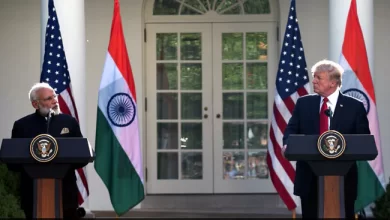
No confidence motion tabled against PM Imran Khan in Pakistan National Assembly
Khan, 69, came to power in 2018 with promises to create a ‘Naya Pakistan’ but miserably failed to address the basic problem of keeping the prices of commodities in control, giving air to the sails of opposition ships to make war on his government.
Pakistan’s opposition on Monday tabled a no-trust motion in the National Assembly against Prime Minister Imran Khan who is facing his toughest political test since assuming office in 2018 as defections in his party and cracks in the ruling coalition appeared to have made his position fragile.
As the much-anticipated session began after a two-day recess on Monday, Deputy Speaker Qasim Khan Suri asked the members of the Parliament, who are in favour of the motion, to stand up so that their numbers could be counted.
Leader of the Opposition and PML-N President Shehbaz Sharif first moved a resolution to allow tabling of the no-confidence motion in the National Assembly, the lower house of bi-cameral parliament, which was approved by 161 yes votes.
Deputy Speaker Suri, who was chairing the session in the absence of Speaker Asad Qaidar, ruled that the “permission is granted to present the no-confidence resolution”.
It was followed by tabling of the no-confidence motion by Sharif, capping the first phase of the constitutional procedure.
“Through this resolution, under clause 1 of Article 95 of the Constitution of the Islamic Republic of Pakistan, this House resolves that it has no confidence in the prime minister, Mr Imran Khan Niazi, and consequently, he shall cease to hold office under clause 4 ibid,” he said.
Since the voting should be held between 3-7 days, Suri prorogued the session until 4 pm March 31, when it would reconvene for debate and voting.
Prime Minister Khan needs 172 votes in the house of 342 to foil the bid. Since Khan’s allies with 23 members are still not committed to support him and about two dozen lawmakers from within the ruling Pakistan Tehreek-e-Insaf have revolted, the situation was still fluid.
To placate one of its coalition partners, Khan’s party on Monday announced to give the post of chief minister of Punjab to the Pakistan Muslim League-Q (PML-Q).
The PML-Q, an important ally of the PTI at the Centre and the Punjab province, had reportedly asked Prime Minister Khan to announce its leader Chaudhry Pervaiz Elahi as the replacement of Punjab Chief Minister Buzdar before calling the National Assembly session to take up the Opposition’s no-trust motion.
The PML-Q has acquired a central role in the ongoing political drama despite having only five Members of the National Assembly.
“Pakistan Tehreek-e-Insaf will support Chaudhry Pervaiz Elahi as a candidate for the chief minister [in Punjab] and the PML-Q has announced to support PM amid in no-confidence motion,” the prime minister’s aide on political communication, Shahbaz Gill, made the announcement on twitter in Urdu.
Khan’s protege and hand-picked Punjab chief minister Buzdar presented his resignation to the prime minister on Monday.
Buzdar’s removal was also sought by rebel lawmakers. Earlier, a no-confidence motion was also filed against Buzdar in the provincial assembly.
“Chaudhry Pervaiz Elahi meets Prime Minister Imran Khan. All issues were settled in the meeting. PML-Q expresses confidence in PM and announces support. Chief Minister Usman Bazdar tenders his resignation to PM. Prime Minister Imran Khan has decided to nominate Chaudhry Pervez Elahi as the new Chief Minister of Punjab,” Minister of State for Information and Broadcasting Farrukh Habib tweeted.
However, PML-Q leader Tariq Basheer Cheema said that he has resigned from the cabinet and will support the opposition in the no-confidence vote.
Another ally of the ruling coalition, the Balochistan Awami Party (BAP), on Monday announced that it had “accepted the opposition’s invitation” to vote against Khan, making the opposition stronger with 168 votes.
Khan, 69, is heading a coalition government and he can be removed if some of the partners decide to switch sides. The PTI has 155 members in the 342-member National Assembly and needs at least 172 lawmakers to retain power.
The country plunged into uncertainty on March 8 after the combined opposition submitted the motion with the National Assembly along with a requisition to the speaker to summon the session within mandatory 14 days.
Though the session was called on March 25, three days after the deadline, the speaker refused to allow the motion to be tabled.
Talking to media, Interior Minister Sheikh Rashid said that the no-confidence resolution would be decided by March 31, adding that Prime Minister Khan was not going anywhere.
He also said that the Prime Minister had rejected his proposal to call snap elections, dissolve the Punjab Assembly and impose governor’s rule in Sindh. He also said that the Pakistan Muslim League-Nawaz had permission of Islamabad’s administration to hold a rally in the capital on Monday.
In a massive show of strength ahead of the crucial no-confidence motion against his government, Khan on Sunday addressed a mammoth rally in the national capital where he claimed that foreign powers were involved in a conspiracy to topple his coalition government.
Khan came to power in 2018 with promises to create a ‘Naya Pakistan’ but miserably failed to address the basic problem of keeping the prices of commodities in control, giving air to the sails of opposition ships to make war on his government.
News Credit: India TV News





